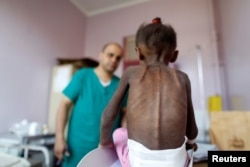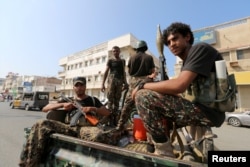Redeployment of opposing forces in Yemen’s civil war away from crucial seaports could begin within days, but that development is being tempered by a warning that humanitarian operations are at risk of running out of money in a matter of weeks.
“Things are very bad, and unfortunately, aid agencies are running out of money,” U.N. humanitarian chief Mark Lowcock told a meeting of the U.N. Security Council on Tuesday. “Among the many challenges the aid operation faces, funding is quickly becoming the biggest. We expect current resources to be used up by the end of March — just six weeks from now.”
The U.N.-coordinated aid operation in Yemen is the largest on the planet and includes more than 250 organizations.
The World Food Program is now feeding some 10 million Yemenis each month and is working to scale that up to 12 million monthly. But such an operation takes enormous amounts of money.
Lowcock said the U.N. is seeking $4.2 billion for 2019 to meet the needs of a country where 80 percent of the population requires assistance and protection.
“Without adequate resources, the aid operation will grind to a halt at a time when more people need more help than ever before,” Lowcock said. “Humanitarian agencies aim to assist up to 19 million people across the country in 2019.”
That is more than half of the country’s population.
Next Tuesday, Sweden and Switzerland are co-hosting a pledging conference in Geneva. Lowcock urged nations to step up generously.
“Together, we can save millions more lives in Yemen, but only if we have the resources we need,” he said.
Fighters to redeploy
Meanwhile, on the political front, the parties are moving toward implementing a December agreement to redeploy their forces away from three major seaports.
“The parties have agreed to redeploy from the ports of Saleef and Ras Isa in a first step, followed by a redeployment from Hodeida port and critical parts of the city associated with humanitarian facilities in step two,” U.N. Yemen envoy Martin Griffiths told the council by video conference from Amman.
Griffiths said the first phase could begin “possibly even today or tomorrow.”
He said this would allow access to the Red Sea Mills — silos where WFP has some 51,000 metric tons of wheat stored — enough to feed nearly 4 million people for one month.
The Saudi-led coalition took back control of the area where the silos are in November, but rebel Houthi fighters control the access route to the area, and their forces have refused to let the U.N. cross the front lines to enter the silos. The U.N. has warned that the grain could soon rot.







